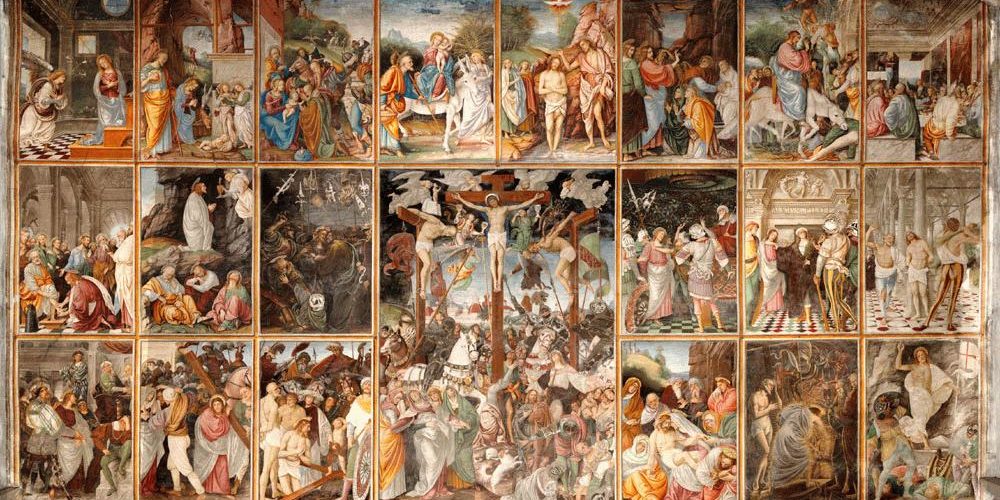
Surprised by Christology
I was recently asked to lead the Christology section of my church’s Sunday School class on systematic theology. By God’s grace (and the kind invitation of my pastors), I have the privilege of looking at the person and work of Christ for four weeks with my fellow members. While preparing for this joyful exercise, I confess I was intimidated by how to start. Where to begin? How should one set out to climb Everest? My answer is to strike right at the nerve of both familiarity and surprise, with doxologies like those found in 1 Timothy 1:15-17 and Jude 24-25. We begin with praise.
The saying is trustworthy and deserving of full acceptance, that Christ Jesus came into the world to save sinners, of whom I am the foremost. But I received mercy for this reason, that in me, as the foremost, Jesus Christ might display his perfect patience as an example to those who were to believe in him for eternal life. To the King of the ages, immortal, invisible, the only God, be honor and glory forever and ever. Amen. (1 Timothy 1:15–17)
Now to him who is able to keep you from stumbling and to present you blameless before the presence of his glory with great joy, to the only God, our Savior, through Jesus Christ our Lord, be glory, majesty, dominion, and authority, before all time and now and forever. Amen. (Jude 24–25)
We Begin With Praise
Why start with doxologies like these? Because Christians don’t tackle the topic of Christology from a place of neutrality, which is important to keep in mind as we dive deep and are introduced to new terms—when we’re stretched to think of the person and work of Christ in ways we’ve never thought of before. A four-part study on Christology might overwhelm the average Christian by its flurry of information. However, these doxologies help remind us that if we are Christians, we do not approach this topic from scratch. We study this subject “from the inside,” so to speak. Not as disinterested students, but as worshippers. Christology is for those of us who know that these things are true and wish to delve more deeply into God’s word (and its good and necessary consequences) so as to ponder in what manner these things are true. Click To TweetTo be a Christian, is to affirm and say “amen” to everything in these doxologies. “Christ Jesus came into the world to save sinners…” so “those who believe in him believe for eternal life;” “… he is the King of the ages, immortal, invisible, the only God” to whom be “honor and glory forever and ever.” To be a Christian is, at the very least, to gladly ascribe “glory, majesty, dominion, and authority” to “the only God, our Savior, through Jesus Christ our Lord.” To be a Christian is to know that all of these things are true. We confess and pray and praise these truths of Christ. We can identify with the apostle Peter, when he writes, “Though you have not seen him, you love him. Though you do not now see him, you believe in him and rejoice with joy that is inexpressible and filled with glory, obtaining the outcome of your faith, the salvation of your souls” (1 Peter 1:8-9)
So, the study of Christology is for those of us who know that these things are true and wish to delve more deeply into God’s word (and its good and necessary consequences) so as to ponder in what manner these things are true. Which is to say, we should be confident as we approach this subject that the most important prerequisite for understanding these things truly has already been checked off the list for every Christian: Christ has saved us, and we love him. We do not approach our subject disinterestedly. We are Mary, sitting at the feet of Jesus, desperately hanging on to every word (Luke 10:39)
Faith Seeking Understanding
That being said, I would give a false impression if I were to lead my listeners to believe that total comprehension of our subject was possible. We’re going to run up against genuine mysteries: things we will never understand in a comprehensive sense. And of course, this is ok. We are not trying to understand what is impossible for creatures like us to understand, we are trying to locate the mystery in the right place so as to properly preserve our worship. As that great Puritan Stephen Charnock famously quipped: “Though we cannot comprehend him as he is, we must be careful not to fancy him to be what he is not.”[1]
Which is all to say, we want to have the kind of posture toward Christology (and indeed, toward every topic of theology) that we find in the medieval theologian and Archbishop, Anselm of Canterbury, who wrote, “Teach me to seek You, and reveal Yourself to me as I seek, because I can neither seek You if You do not teach me how, nor find You unless You reveal Yourself. Let me seek You in desiring You; let me desire You in seeking You; let me find You in loving You; let me love You in finding You.” Anselm goes on to say, “For I do not seek to understand so that I may believe; but I believe so that I may understand.”[2] In other words, our posture in theology should be one of faith seeking understanding. This is what I mean by beginning with familiarity: we remind ourselves that Christians who study Christology are lovers who already love the Beloved, and are getting better acquainted with their heart’s greatest delight.Christians who study Christology are lovers who already love the Beloved, and are getting better acquainted with their heart’s greatest delight. Click To Tweet
Beginning from this point of familiarity actually also helps us to establish an appropriate sense of surprise by Christology. In his helpful new book, Trinitarian Dogmatics, D. Glenn Butner reminds us, “If we are to develop a dogmatic account of the divine missions [which includes events like the incarnation and the Spirit’s work on Pentecost], we must begin from a position of surprise, returning to the scandal and stumbling block of the salvific work of God (1 Cor. 1:23; 1 Pet. 2:8).”[3] For those of us who live in a world where Christianity has existed for two millennia, it can be easy for us to take doctrines like the Trinity and Christ’s incarnation for granted. Even if we are new to the faith, and once thought the idea of the Trinity was crazy, most of us will have at least had some notion of people called “Christians” who believed in this idea. Much of the world is not shocked to hear of a group of people who claim to be monotheists, but whose one God is somehow also three.
Familiarity and Surprise
But it is helpful for us to remind ourselves of how this idea must have landed on people in Jesus’s day. There were monotheists and there were polytheists—those who believed in one God, and those who believed in many gods—and that was it. Those were pretty much your only two options in first century Rome. So, for God to reveal progressively over time that the one God exists eternally as Father, Son, and Spirit, was a massive paradigm shift. In contrast to the tribal deities of the surrounding pagan nations, or the pantheon of gods accepted in the Greco-Roman world, Israel was to worship one God who created heaven and earth: “Hear, O Israel: the LORD our God, the LORD is one” (Deuteronomy 6:4).
With the advent of Christ, and within the flow of God’s continual self-revelation, something marvelous happens. The prophetic witness of Christ and his apostles begin to describe three distinct persons with divine language, attributing divine descriptions not just to the Father, but also to the Son, and the Spirit. And yet, at no point in the New Testament do we see Christ or the apostles back away from the former Old Testament claims regarding monotheism. They are not theological revisionists. They do not add an asterisk to their monotheistic claims. Instead, Christ and his apostles uniformly double down on the claim that there is one and only one God, even when they make breathtaking claims about three distinct persons (John 17:3; Romans 3:30; 1 Timothy 1:17; James 2:19).Insisting on contemplation of Christology in a state of familiar love and delighted surprise is a helpful safeguard to preserve our praise. Click To Tweet
In fact, that anthem we just read from Deuteronomy 6:4 is picked up in New Testament revelation and Christianized. Paul quotes this verse but puts Christ into it in 1 Corinthians 8:6: “yet for us there is one God, the Father, from whom are all things and for whom we exist, and one Lord, Jesus Christ, through whom are all things and through whom we exist.” And this is no imposition on Paul’s part, since Christ himself takes the name of Israel’s covenant-making, covenant-keeping God as his own, when he says, “before Abraham was, I am.” (John 8:58). No Jewish follower of Christ in Jesus’s day or thereafter was asked to abandon his former embrace of monotheism. In fact, every Jewish Christian was explicitly forbade to do this. The Athanasian Creed has good and biblical warrant for insisting that “just as Christian truth compels us to confess each person [Father, Son, and Spirit] as both God and Lord, so catholic religion forbids us to say that there are three gods or lords.” Unless we are completely oblivious to the gravity of the Bible’s portrayal of God as one and of Christ as God the Son incarnate, the only fitting way for us to approach Christology is in a state of perpetual and delighted surprise.
Insisting on contemplation of Christology in a state of familiar love and delighted surprise is a helpful safeguard to preserve our praise. In this paradoxical state of familiarity and surprise, we will find ourselves eager to plumb the depth of meaning behind the central confession that Jesus Christ is God the Son incarnate. Jesus is he who is God, and who without ceasing to be God, became man “for us and for our salvation.” He, the one who saved us and the one whom we love, is one person in two natures. And in this state of familiarity and surprised, we will find ourselves eager to receive language and categories handed down to us by the Great Tradition—language and categories we might otherwise find intimidating or needlessly obscure (like the hypostatic union or the communicatio idiomatum or the extra calvinisticum). In this state, we will gladly take anything that helps us to more adequately praise the one by whom we are continually surprised.
Endnotes
[1] Stephen Charnock, Existence and Attributes of God, 1:197.
[2] Anselm, Proslogian, chapter 1.
[3] D. Glenn Butner, Trinitarian Dogmatics: Exploring the Grammar of the Christian Doctrine of God, 168.

